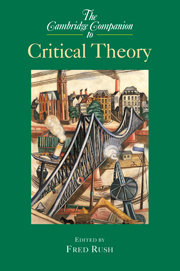Book contents
- Frontmatter
- Introduction
- 1 Conceptual foundations of early Critical Theory
- 2 Benjamin, Adorno, and the decline of the aura
- 3 The dialectic of enlightenment
- 4 The marriage of Marx and Freud
- 5 Dialectics and the revolutionary impulse
- 6 “The dead speaking of stones and stars”
- 7 Critique, state, and economy
- 8 The transcendental turn
- 9 The politics of Critical Theory
- 10 Critical Theory and the analysis of contemporary mass society
- 11 Critical Theory and poststructuralism
- 12 The very idea of a critical social science
- 13 A social pathology of reason
- Select bibliography
- Index
5 - Dialectics and the revolutionary impulse
Published online by Cambridge University Press: 28 May 2006
- Frontmatter
- Introduction
- 1 Conceptual foundations of early Critical Theory
- 2 Benjamin, Adorno, and the decline of the aura
- 3 The dialectic of enlightenment
- 4 The marriage of Marx and Freud
- 5 Dialectics and the revolutionary impulse
- 6 “The dead speaking of stones and stars”
- 7 Critique, state, and economy
- 8 The transcendental turn
- 9 The politics of Critical Theory
- 10 Critical Theory and the analysis of contemporary mass society
- 11 Critical Theory and poststructuralism
- 12 The very idea of a critical social science
- 13 A social pathology of reason
- Select bibliography
- Index
Summary
REVOLUTION
A story has it that during the storming of the Bastille in 1789, King Louis XVI, hearing the commotion, asked one of his courtiers what was going on, a riot (émeute) perhaps? “No, Sire,” the courtier is said to have replied, “a revolution.” One of several reasons for being suspicious of this story is that it seems to attribute to the courtier preternatural prescience. The nineteenth and twentieth centuries in Europe were to be the age of revolution, and this is at least as much a claim about intellectual history as it is about real political and social history. To be sure, the history of this period, from the Oath of the Tennis Court at the start of the first French Revolution to the fall of the Berlin Wall in 1989, can be told as the story of a series of radical transformations of the political and socioeconomic structures of various European societies. The nineteenth and twentieth centuries, however, were not just a period of actual instability and change, but one in which people acquired certain general ideas about the possibilities of large-scale social change and the human ability to unleash and perhaps control it. More or less spontaneous urban and rural violence, rebellions, jacqueries, uprisings of subjugated populations, conspiracies to seize established power, have been the stuff of much of human history for a long time, but events like this come to take on a new character altogether when the actual and potential participants (and the actual and potential opponents) acquire even a rudimentary general conceptual framework with which to understand their situation, the possible courses of action they could undertake, and the possible outcomes.
- Type
- Chapter
- Information
- The Cambridge Companion to Critical Theory , pp. 103 - 138Publisher: Cambridge University PressPrint publication year: 2004
- 5
- Cited by



